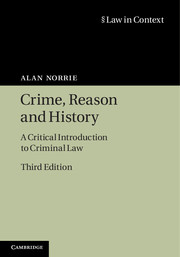Book contents
- Frontmatter
- Dedication
- Contents
- Preface to the third edition
- Preface to the second edition
- Preface to the first edition
- Table of cases
- Table of statutes
- Prologue: A brief history of the ancient juridical city of Fictionopolis
- Part I Context
- Part II Mens rea
- Part III Actus reus
- Part IV Defences
- 8 Necessity and duress
- 9 Insanity and diminished responsibility
- 10 Self-defence
- 11 Loss of control
- Part V Concluding
- Bibliography
- Index
9 - Insanity and diminished responsibility
Published online by Cambridge University Press: 05 October 2014
- Frontmatter
- Dedication
- Contents
- Preface to the third edition
- Preface to the second edition
- Preface to the first edition
- Table of cases
- Table of statutes
- Prologue: A brief history of the ancient juridical city of Fictionopolis
- Part I Context
- Part II Mens rea
- Part III Actus reus
- Part IV Defences
- 8 Necessity and duress
- 9 Insanity and diminished responsibility
- 10 Self-defence
- 11 Loss of control
- Part V Concluding
- Bibliography
- Index
Summary
[T]he M’Naghten test is based on an entirely obsolete and misleading conception of the nature of insanity.
(Royal Commission on Capital Punishment, 1949–53, 80)The insanity defence holds a special fascination because it appears (falsely) to be a limited technical issue … The point is that the technical issue keeps slipping away, since the real issue is to make decisions about how to distribute power.
(Smith, 1981, 172)Introduction
In this chapter, we consider the general defence of insanity which is available in relation to all crimes, and the additional partial defence of diminished responsibility, which is available only to reduce a murder charge to manslaughter. It is widely accepted that the law on insanity is inadequate (see eg the Committee on Mentally Abnormal Offenders, 1975, 217–19). The general defence is too narrow in its test for insanity and too broad in terms of its concept of disease. The result of this is that many defendants whom most people would regard as insane cannot use the defence, while some whom most would regard as perfectly sane are forced to use it if they want to deny responsibility for a crime. For the former group, the additional partial defence of diminished responsibility operates, but only to scale murder down to manslaughter. For the latter group, it is sometimes better to plead guilty to the charge than to have one’s physical condition (for example, epilepsy: Sullivan (1983); or diabetes: Hennessy (1989)) forced into the law’s pigeonhole of insanity.
- Type
- Chapter
- Information
- Crime, Reason and HistoryA Critical Introduction to Criminal Law, pp. 237 - 273Publisher: Cambridge University PressPrint publication year: 2014



